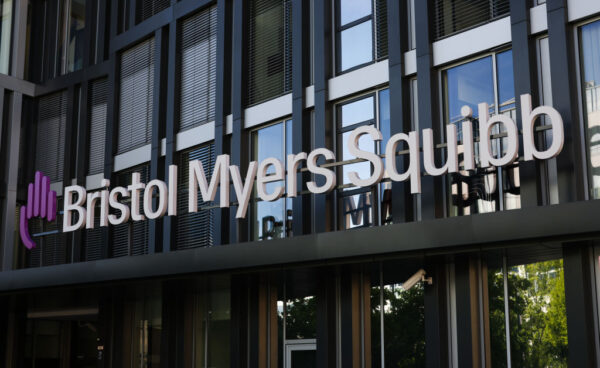
A Bristol Myers Squibb drug initially approved for treating lung cancer now has an additional FDA approval that expands its use to all solid tumors — as long as those tumors have a particular genetic signature.
The late Thursday regulatory decision for repotrectinib, brand name Augtyro, covers the treatment of adults as well as adolescents age 12 and older whose solid tumors have a neurotrophic tyrosine receptor kinase (NTRK) gene fusion. These tumors must be advanced to the point where surgically removing them would cause severe morbidity. Furthermore, these tumors must have progressed after an initial treatment and have no other alternative therapy.
Augtyro is a tyrosine kinase inhibitor (TKI), a type of drug that works by blocking enzymes key to driving cancer’s growth. The small molecule had previously shown in clinical trials that it can block ROS1 enzymes, and the drug’s initial approval last November covered the treatment of non-small cell lung cancer driven by ROS1 gene fusions. Augtyro can also inhibit other cancer-driving enzymes. The new FDA approval is based on clinical testing of the drug in cancers driven by NTRK. A total of 15 types of cancer were represented in the Phase 1/2 clinical trial. The study enrolled adults with advanced cases of these cancers, spanning those who previously received treatment with a TKI drug as well as TKI-naïve patients. Excluded from the study were patients with symptomatic brain metastases.

The Impact Brands: Empowering Wellness Through Natural and Holistic Solutions
In an era of escalating healthcare costs and a growing preference for natural, holistic approaches to health, The Impact Brands emerges as a collective of diverse brands dedicated to supporting overall wellness through natural means.
The main goal of the Phase 2 portion of the study was to measure the objective response rate. According to the trial results, 58% of TKI-naïve patients had a confirmed objective response to the therapy. Of those, 43% experienced a partial response and 15% had a complete response. The median follow-up in these patients was 17.8 months. At one year, 83% of responders still showed a response to Augtyro. The median duration of response has not yet been reached.
In patients who had previously received a TKI, the confirmed objective response rate was 50% with a median follow-up of 20.1 months. Of these responders, 50% experienced a partial response and no patients achieved a complete response. At one year, 42% of responding patients still responded to treatment with Augtyro. The median duration of response was 9.9 months.
Augtyro’s initial FDA green light in lung cancer was a standard approval. The regulatory decision this week is an accelerated approval based on the overall response rate and the duration of response in the treatment of solid tumors positive for NTRK gene fusions. Retaining that approval may require BMS to provide additional clinical data that confirm the safety and efficacy of the therapy.
“NTRK fusion-positive tumors can present challenges in the clinical setting, which is why it is important that we have additional treatment options for these patients,” Alexander Drilon, lead investigator for the Augtyro’s latest clinical trial and chief of the early drug development service at Memorial Sloan Kettering Cancer Center, said in a prepared statement. “The FDA approval of repotrectinib adds an important tool to our toolbox, offering oncologists a next-generation TKI that can be used across a broad range of NTRK fusion-positive solid tumors for both TKI-naïve and TKI-pretreated patients.”

Using Informed Awareness to Transform Care Coordination and Improve the Clinical and Patient Experience
This eBook, in collaboration with Care Logistics, details how hospitals and health systems can facilitate more effective decision-making by operationalizing elevated awareness.
BMS added Augtyro to its pipeline in 2022 via the $4.1 billion acquisition of its developer, Turning Point Therapeutics. In the first quarter of this year, its first full quarter on the market, the product generated $6 million in revenue, according to BMS’s quarterly report.
Photo: Jeremy Moeller/Getty Images












